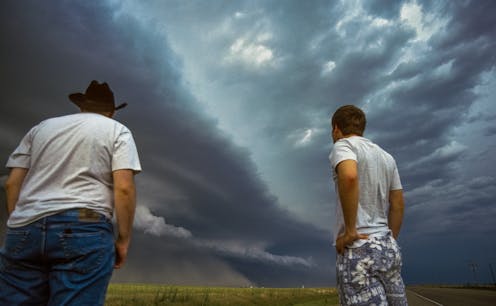
Two vans pull over on a grassy hilltop. Inside sit a dozen meteorology students and their professor. From here, you can see in all directions because we are in the Great Plains of North Dakota. You can also hear the rumbling from a thunderstorm overhead. This is what they have come to see.
The local college had organised a storm-chasing field trip. The students had been enthused for this moment, ever since the professor forecast that this would likely be “the storm of the year” and one that could produce an “earth-grinding tornado”.
We are therefore surprised to see the students hardly paying attention when the professor reports that the storm is producing hail the size of grapefruit. Instead, we find them tired and inattentive. One is even drifting into sleep.
As management scholars would put it, the team is suffering from low engagement – the degree to which we are cognitively, emotionally and physically immersed in our tasks. The problem is not that these students lack passion. Rather, they spent all week focusing narrowly on a tornado scenario that is now failing to happen.
Understanding how people engage with work in uncertain settings is what we, two management professors, are here to study. Engagement is an essential part of successful performance in many organisations, where work demands are complex, fast-paced, and require creativity.
While it might seem surprising to find business school academics embedding with storm chasers, it represents the management field’s growing interest in what are called extreme contexts.
The idea is that unconventional settings have a lot to teach those of us in more familiar workplaces, especially where the organisations in them have adapted to extreme conditions.
For instance, if you want to learn about safety and reliability, a good place to look is at nuclear power plants where mistakes have dire consequences. Lessons about improvisation on the other hand, might be found among police tactical units or mountaineers, whose lives depend on it.
And so to understand how people engage with work under uncertainty, we looked to storm chasing. Over three years, we accompanied the chasers through both the exciting and mundane moments.
The value of work engagement
Storm chasing involves the pursuit of severe weather. Chasers who have encountered a powerful tornado will attest to the exhilarating, even spiritual, nature of the experience.
It might seem like a highly engaging line of work for those who chase professionally – scientists, tour operators and those who make a living from selling their footage.
Yet, the opposite is often true. As one of us had previous chasing experience, we were familiar with the fact that much of it involves boredom and disappointment. Teams spend their days preparing for dramatic encounters with severe weather that mostly fails to live up to expectations.
You might not think storm chasing is similar to your work, but our research shows that it holds valuable lessons about how people can stay engaged and enthused about their job.
Work engagement is associated with valuable outcomes for people and their organisations, including creative output, commitment and a sense of wellbeing. Yet many people struggle to stay engaged, feeling distracted or de-energised.
This can partly be attributed to the lack of meaningful work in many modern jobs. But our research highlights another reason: that many of us are enthusiastic about our work yet find only fleeting opportunities to engage with our core tasks.
Consider the firefighter who signs up to rescue people from blazes, only to spend their days attending false alarms. Or the news correspondent who arrives on scene to report an important story but finds nothing much happening. Such unpredictable and intermittent work demands wear down people’s enthusiasm.
Even as we spend more time at our workplaces, professionals ranging from consultants to engineers report they do not get enough time to engage with the important or desirable tasks, something that has been shown to lead to a lack of productivity, accidents and even a loss of professional identity.
The good news is that our research shows that many storm chasers have learned to stay engaged with their work, even in the slowest periods where nothing exciting appears to be happening.
The trick is that these chasers do not just wait for events like tornadoes to happen. Instead, they transform the present moment into an opportunity to engage with meaningful tasks.
First, chasers broaden what they consider to be meaningful tasks, for instance by cultivating an appreciation for commoner, more predictable weather scenarios. As one tour operator told us: “We tell clients … we regularly see supercells … [which] can be more beautiful and photogenic than tornadoes.”
Second, chasers enrich their downtime, filling it with activities (testing a new forecasting technique, for example) that let them feel the day has been spent productively even if no storms occurred.
Third, chasers extend the duration of their core tasks. As one team leader explained, the time spent preparing and debriefing can be “more important [in keeping members enthused] than the five minutes you get with the tornado after eight hours of driving”.
Our research shows that we can be more engaged at work when we appreciate the broader range of tasks that come our way, enrich idle periods with meaningful activities, and stretch out the energising moments when we do encounter them.
Derin Kent received funding from the HSE Support Foundation and the Marcus Wallenberg Foundation.
Nina Granqvist does not work for, consult, own shares in or receive funding from any company or organisation that would benefit from this article, and has disclosed no relevant affiliations beyond their academic appointment.
This article was originally published on The Conversation. Read the original article.







